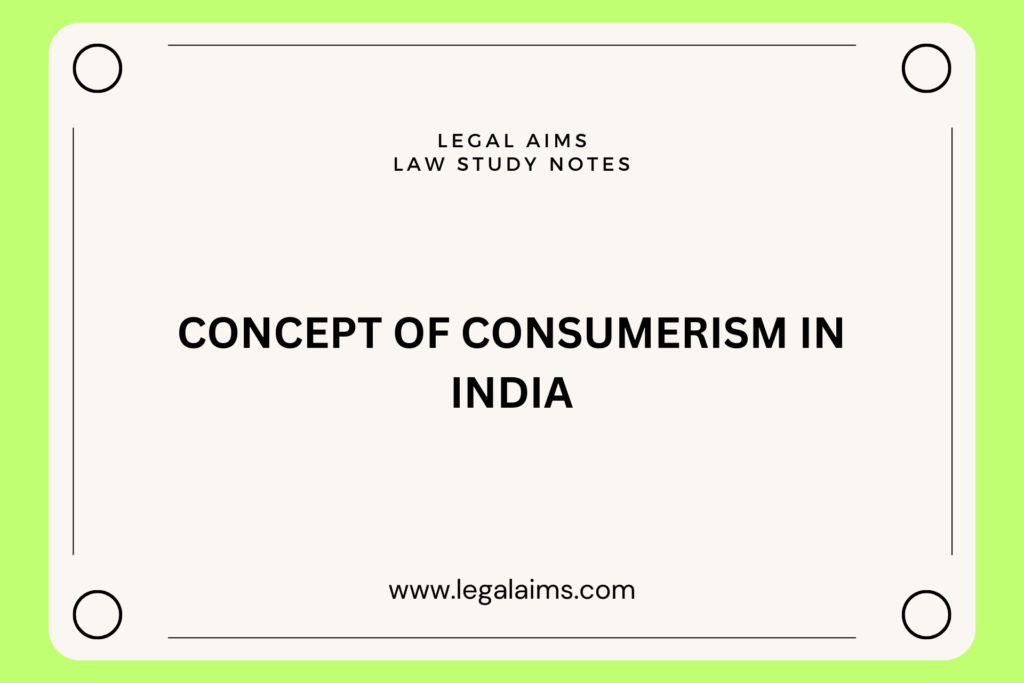Consumerism in India
Consumerism in India: A Comprehensive Overview of the Growing Trend | Legal Aims
Consumerism in India
concept of consumerism in India
The consumer in India had started its journey with a need to raise his voice against the quality of goods as early as 1969 through housewives in Mumbai.
It took the shape of a revolution at a later stage, and one day, our parliament passed an act for the welfare of consumers in 1986.
The consumer is the person who purchases the goods and services for his self-consumption including the use of the goods for his self occupations.
Consumerism means “the welfare of the consumer by safeguarding their rights by giving required protection to them from restrictive trade practices and unfair trade practices, and also from the goods/services injurious to them, and to save them from the economic exploitations by the well organized and trained sellers/traders/manufacturers of goods and services.
Consumerism has over time developed into a sound force designed to aid and protect the consumer by exerting legal, moral, and economic pressure on producers and providers in some of the developed countries.
The success of consumerism lies in the realization of the business that there is no substitute for voluntary self-regulation. Little attention from the business will not only serve consumers’ interests but will also benefit them.
The best possible solution is that the Consumers must be aware of their rights, join voluntary Consumer organizations, raise a voice against exploitation, and seek redress of their grievances in time.
Consumerism means
- The theory is that increasing the consumption of goods is economically beneficial or desirable.
- A movement advocating greater protection of the interest of consumers.
- The movement seeks to protect and inform consumers by requiring such practices as honest packaging and advertising, product guarantees, and improved safety standards.
- Public concern over the rights of consumers, the quality of consumer goods, and the honesty of advertising.
- The equation of personal happiness with consumption and the purchase of material possessions.
- The promotion of consumer interest. etc.
Consumerism devotes a thorough safeguard for the consumers from all sorts of malpractices and exploitative deeds of market operators.
The consumer has to be protected from evils like unfair trade practices, adulteration, spurious and injurious manufacturers, black marketing, price hike, overcharging, misguidance by false advertisements, misuse of trademarks, and patents, non-labeling and mislabeling, duplications, and similar other deceitful market practices.
Technically, consumerism refers to protection against duping of the market, protection against the sale and supply of bad goods, substandard and duplicate consumer products in the market; non –supply or short supply of consumer goods, unwarranted and excessive pricing, and false and Misleading advertisement camouflaging the truth.
#1 How has consumerism grown in India?
Consumerism in India has experienced significant growth in recent years. Factors such as rising disposable incomes, urbanization, globalization, increased access to credit, and the influence of media and advertising have contributed to the growth of consumerism in the country.
What are the major drivers of consumerism in India?
Some key drivers of consumerism in India include increased urbanization, expanding middle class, changing lifestyles and aspirations, exposure to global brands and products, the influence of social media, and easy access to credit and financing options.

Read More: Internship Opportunity at Aranya Moulick, Advocate, Delhi: Apply by October 7

